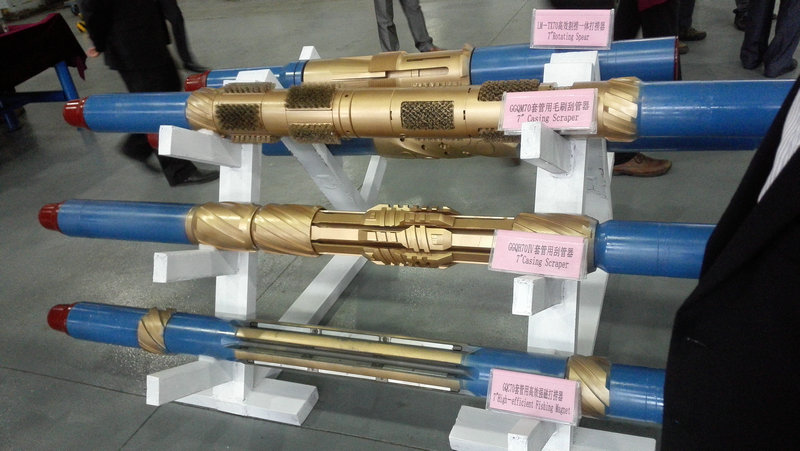In wellbore cleaning, rotating and non-rotating casing Scrapers differ primarily in their operational mechanics and suitability for specific well conditions. Here’s a structured comparison and conclusion:

Rotating Casing Scrapers
- Mechanism: Utilize rotation (often combined with reciprocation) to aggressively abrade casing walls.
- Strengths:
- Effective for tough deposits: Ideal for removing hardened filter cake, scale, or debris due to enhanced mechanical action.
- Thorough cleaning: Rotation ensures full circumferential coverage, improving cement bond quality.
- Efficiency: May reduce cleaning time in vertical or simple wellbores.
- Limitations:
- Casing wear: Higher risk of damaging casing integrity, especially in older or thinner casings.
- Operational risks: Potential for stuck tools or torque issues in deviated/horizontal wells.
- Complexity: Requires rigs capable of managing rotation during scraping.
Non-Rotating Casing Scrapers
- Mechanism: Rely on axial (up/down) movement with spring-loaded blades to scrape debris.
- Strengths:
- Safer in complex wells: Lower risk of getting stuck in deviated, horizontal, or tortuous wellbores.
- Reduced wear: Gentler on casing surfaces, preserving integrity.
- Simplicity: Easier to deploy in challenging geometries.
- Limitations:
- Less aggressive: May require multiple passes for tough deposits.
- Limited coverage: May miss localized debris without rotation.
Which is Better?
The choice depends on well-specific factors:
- Well Trajectory:
- Vertical/Simple wells: Rotating scrapers are preferred for efficiency and thoroughness.
- Deviated/Horizontal wells: Non-rotating scrapers mitigate torque/drag risks.
2.Debris Type:
- Hard deposits: Rotating scrapers excel.
- Soft debris: Non-rotating may suffice.
3.Casing Condition:
- New/robust casing: Rotating is viable.
- Aged/thin casing: Non-rotating reduces wear.
4.Operational Constraints: Time, rig capabilities, and risk tolerance influence the decision.
Conclusion
Neither tool is universally superior. Rotating scrapers are better for aggressive cleaning in straightforward wellbores, while non-rotating scrapers are safer in complex geometries or sensitive casing. Field objectives, well conditions, and risk assessment should guide the selection.
Post time: Apr-10-2025









 5-1203 Dahua Digital Industrial Park Tiangu 6th Road,Hi-tech development Zone Xi'an, China
5-1203 Dahua Digital Industrial Park Tiangu 6th Road,Hi-tech development Zone Xi'an, China  86-13609153141
86-13609153141 

